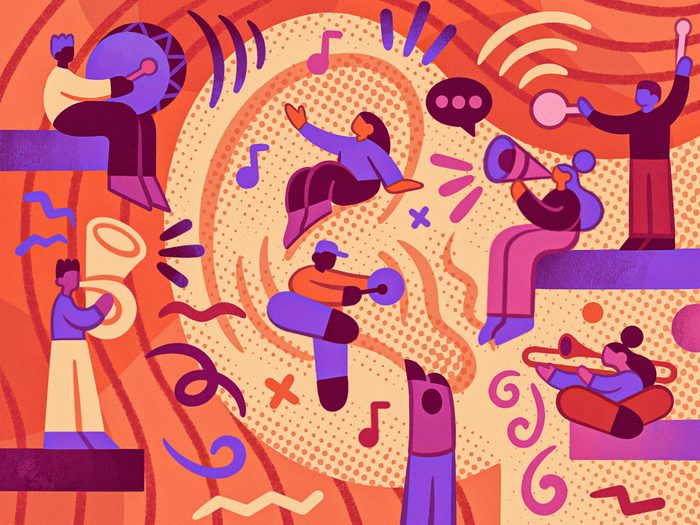I Wear Headphones All Day When I Work, Am I Ruining My Hearing?

Experts offer tips and advice for ear protection and hearing protection.
Unless you’re experiencing problems, chances are you’re not paying too much attention to your ears. But from communication to mental health, and even as a conduit of news between other parts of our bodies, ear health is extremely important for our overall well-being.
While both men and women can experience hearing loss, men are more often affected, likely because they tend to work in noisier environments (think construction, for example) and may not always wear proper ear protection. And though fewer women lose their hearing, one study found even those who do fare better than men because they tend to focus on how to improve communication, rather than on the loss itself. Women may also use more facial expressions, body language and gestures, making it easier for others with hearing loss to understand them.
“Day-to-day communication is the most important reason why our ear health matters,” says Dr. Janet Chung, division chief for otolaryngology at Trillium Health Partners in Mississauga, Ont., and lecturer at the University of Toronto’s Temerty Faculty of Medicine. She says healthy ears allow us to “maintain relationships, create relationships and experience life.”
So, what can we do to protect, maintain and learn to value our ear health?
Turn down the volume
If you’re going to use loud equipment, like a lawnmower or blender, or work in a really noisy environment, like in an ambulance or at a loud bar, Chung says it’s important to wear ear protection, because loud noise exposure—especially when it’s repetitive—can lead to hearing loss. Ear plugs are a great option for everyday loud noises, like an earsplitting spin class. They help by dampening sound and essentially decreasing the decibel level that enters your ears.
This goes for the headphones you use to listen to music, too. Chung recommends you set your volume bar to 70 percent or lower.
Wondering how loud is too loud? The Canada Occupational Health and Safety Regulations state workers shouldn’t be exposed to sounds over 87 decibels for eight hours in any 24-hour period. A typical concert can reach 120 to 129 decibels.
(Related: 11 Surprising Things That Could Ruin Your Hearing)
Forget about cleaning
When it comes to so-called “tools” to remove earwax, such as Q-tips and Q-Grips, you can ditch both, because “the ear is actually a self-cleaning organ,” says Chung. (Studies show that when a dot of ink is placed on the eardrum, you can see it migrate out in a few weeks.) Earwax is created by your body for protection—it’s lubricating and has antimicrobial properties. Cleaning your ears takes that away. “You can introduce bacteria by microabrasion or little cuts into the ear skin if you’re using something rough,” she says, or “you can cause a perforation of the actual eardrum if you go too deep.”
If you’re still confused about what can go in your ear, take this piece of advice that Chung learned in residency: “Anything narrower than your elbow should not be put inside your ear.” If you really want that wax out of there and your doctor okays it, she says you can put a few drops of clean olive oil or mineral oil into your ear, which will make the wax slippery and more likely to come out on its own.
Hearing and the brain
“There has been a lot of research in literature in terms of looking at what happens to patients who start losing their hearing,” says Chung. Many of these studies point to effects on mental health, such as depression, which results from the social isolation that people who lose their hearing often experience. Studies have also shown that hearing loss can contribute to a faster rate of brain cell death—potentially because the cells associated with hearing aren’t being used as much. This, combined with social isolation, can also contribute to dementia.
(Related: These Activities Help Prevent Dementia, According to a New Study)
Hearing and the body
Researchers have found that your ears help you pick up cues while you move, and the loss of these signals can impact your balance. Chung adds that patients who have profound hearing loss might need to ensure that they have the right accommodations in place—for example, common devices like fire alarms or egg timers should have flashing lights for safety reasons.
When to see a doctor
You use your ears for listening, but sometimes they’re trying to tell you something. When you go to the doctor with ear pain, you’re usually told it’s an ear infection, says Chung. But there are “so many nerves that end in the ear [that the pain] can actually be due to many other conditions.” For example, you could have a dental infection, jaw pain or a tonsil infection, she says.
Another time to see your doctor is if you experience sudden hearing loss, which in some cases could be caused by an unknown virus. Chung says this can potentially be treated by giving a dose of anti-inflammatories within a certain time frame. “Which is as soon as possible, essentially.”
Next: Why I Needed Hearing Aids Before Age 50—And You Might Too




